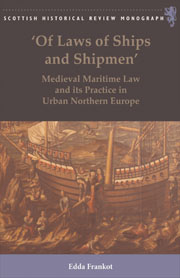Book contents
- Frontmatter
- Contents
- Tables and Maps
- Abbreviations
- Acknowledgements
- Preface
- Introduction
- 1 A History of Maritime Law in Northern Europe
- 2 Shipwreck, Jettison and Ship Collision in Maritime Law
- 3 The Five Towns Introduced
- 4 Written Law: Urban Collections of Sea Law
- 5 Written Law: Local Developments in Lawmaking
- 6 Legal Practice: the Administration of Maritime Justice
- 7 Legal Practice: Maritime Proceedings at the Urban Courts
- Final Conclusions
- Bibliography
- Index
Final Conclusions
Published online by Cambridge University Press: 05 August 2013
- Frontmatter
- Contents
- Tables and Maps
- Abbreviations
- Acknowledgements
- Preface
- Introduction
- 1 A History of Maritime Law in Northern Europe
- 2 Shipwreck, Jettison and Ship Collision in Maritime Law
- 3 The Five Towns Introduced
- 4 Written Law: Urban Collections of Sea Law
- 5 Written Law: Local Developments in Lawmaking
- 6 Legal Practice: the Administration of Maritime Justice
- 7 Legal Practice: Maritime Proceedings at the Urban Courts
- Final Conclusions
- Bibliography
- Index
Summary
This study has aimed to determine whether it is appropriate to speak of a common northern European law of the sea in the period before 1500. A detailed analysis of the spread of the written laws, of their content and of various aspects of legal practice has proven that a common maritime law never came into being in medieval northern Europe. Instead, local variations continued to exist throughout the period, revealing themselves in varying collections of manuscripts, diverging regulations in the law books, a different use of the written laws and dissimilar judgements in the town courts.
Two forms of written sea laws came into existence in the Middle Ages: the customary sea laws and maritime regulations as part of urban laws. Although the customary sea laws were spread over a large area, the local maritime laws continued to play an important role in their towns of origin. When such towns possessed copies of any of the customary sea laws, these were used as auxiliary laws and did not replace the regulations in the town law. There is no evidence that the Rôles d'Oléron were used throughout northern Europe and that the town laws only include additions to them, as was recently suggested. A comparison of the manuscript collections of Aberdeen, Kampen, Lübeck, Reval and Danzig has, moreover, shown that the customary sea laws were not available to all of the towns and that the five town courts had differing book collections at their disposal.
- Type
- Chapter
- Information
- Of Laws of Ships and ShipmenMedieval Maritime Law and its Practice in Urban Northern Europe, pp. 199 - 201Publisher: Edinburgh University PressPrint publication year: 2012



